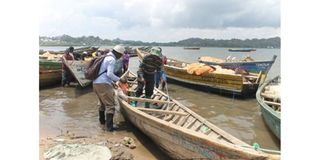Prime
Unlicensed vessels, poor ferry services in Tanzania draw CAG scrutiny

What you need to know:
- Additional shortcomings include lack of a ferry operations database, making it difficult to monitor ferry conditions, maintenance schedules, and capacity
Dar es Salaam. A critical audit report by the Controller and Auditor General (CAG) has revealed deep structural and operational weaknesses in Tanzania’s maritime transport sector, painting a troubling picture of lax oversight, revenue loss, and widespread safety risks.
Nearly nine out of 10 small vessels operating on the Mainland are unlicensed, while more than half of the country’s ferries are currently non-operational due to poor oversight, underfunding, and inadequate maintenance.
According to the CAG’s Annual General Report on performance audit for 2023/2024, released to the public on April 16, 2025, the Tanzania Shipping Agencies Corporation (TASAC) and the Tanzania Electrical, Mechanical and Electronics Services Agency (Temesa) are failing to effectively manage and regulate marine vessels and ferry services.
This, the report warns, has compromised safety, revenue collection, and service delivery to the public.
The report reveals that out of 45,976 small vessels operating in Mainland Tanzania, a staggering 87 percent (approximately 40,004 vessels) are unlicensed.
“This high number of unlicensed vessels is primarily due to the absence of a comprehensive and accessible licensing system for small vessel operations across all regions,” the CAG report stated.
The consequence of these unlicensed operations is twofold: Tasac is unable to track vessel safety and compliance, and the government is losing an estimated Sh2 billion annually in registration revenue.
The CAG also delivered a scathing assessment of ferry operations managed by Temesa and overseen by the Ministry of Works.
The report highlights that ferry services are unreliable, with up to 56 percent of ferries non-operational as of June 2024.
His key findings show that 18 out of 32 ferries were grounded by June 2024, up from 8 the previous year, whereas several vessels, including MV Pangani II, MV Sabasaba, and MV Kilombero, had been out of operation for over six months, either awaiting inspection or deemed unrepairable.
The report also says delays in repairs and deteriorating ferry conditions were attributed to insufficient funding and poor management.
Moreover, ferry services were unavailable in multiple areas identified as needing transport support. A 2021 needs analysis found that only 63 percent of the required ferry stations were operational.
“The ministry of Works and Temesa failed to update the needs analysis or align ferry services with actual demand,” the CAG noted, citing outdated data and misaligned planning.
The report also raised red flags over a public-private partnership between Temesa and Azam Marine Co. Ltd, contracted to operate ferry services between Magogoni and Kigamboni.
“TEMESA lost some revenues by paying Sh5 million to Azam Marine Co.Ltd per day from the total amount of the collected revenue. Between June 2022 and June 2024, TEMESA paid over sh2.84 billion to Azam Marine, equivalent to the cost of acquiring a new ferry. “
Yet, the agency failed to consistently track the number of trips made by the sea taxis, raising concerns about accountability and value for money.
Additional shortcomings identified in the audit include lack of a ferry operations database, making it difficult to monitor ferry conditions, maintenance schedules, and capacity.
There was also inadequate revenue control mechanisms, such as untracked boarding at Luchelele Ferry Station and unbanked toilet revenue in Kigongo Busisi, managed by an internal association without a formal contract.
The report further discovered inefficient ferry schedules, failing to align with peak passenger demand in locations like Kilindoni and Temesa.
At some stations, no system existed to count actual passengers, contradicting national safety regulations. This exposes passengers to overloading risks, especially during peak hours, and undermines accurate revenue collection.
Recommendations
In light of the shortcomings the CAG has issued a series of strong recommendations which says that TASAC should enforce the mandatory registration and licensing of all marine vessels, especially those over 50 Gross Tonnage (GT), and establish a modern vessel registration database.
The CAG on the other hand has urged TEMESA to improve ferry service availability and reliability, align ferry schedules with passenger demand, create a comprehensive ferry management system, enhance revenue controls and identify alternative income streams.
Whereas the Ministry of Transport has been advised to develop a National Maritime Transport Master Plan and operationalize the Marine Search and Rescue Plan.
As Tanzania pushes to modernise its transport infrastructure and expand access to underserved regions, the findings underscore the urgent need for reforms in the maritime sector.
Without addressing the gaps in regulation, enforcement, maintenance, and financial oversight, the country risks further economic losses and safety hazards on its waterways.
“It is imperative that TASAC, TEMESA, and the Ministry of Transport take decisive action to implement these recommendations and restore public trust in marine transport services,” the CAG said.





